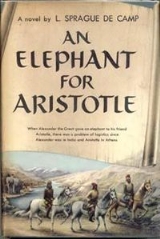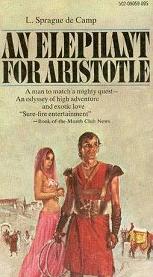
An Elephant for Aristotle
Encyclopedia
An Elephant for Aristotle, is a 1958 historical novel
by L. Sprague de Camp
. It was first published in hardback by Doubleday, and in paperback by Curtis
in 1971. It is the first of de Camp's historical novels in order of writing, and third chronologically.
commander who has been tasked by Alexander the Great to bring an elephant
captured from the India
n ruler Porus, to Athens
as a present for Alexander's old tutor, Aristotle
. Leading a motley crew that includes an Indian elephantarch to care for the creature, a Persian
warrior, a Syria
n sutler and a Greek philosopher, Leon sets out to cross the whole of the ancient known world from the Indus River
to Athens
.
The journey is long and adventurous, involving frequent skirmishes with bandits
, unruly noblemen, Macedonian
commanders with ideas of their own about who's in charge, and a runaway Persian noblewoman. It doesn't help that the goal of the whole enterprise is essentially a malicious prank concocted by Alexander on his former teacher: he gifts Aristotle with the elephant but no funds for its upkeep, while sending the funds (but no elephant) to the savant's arch-rival Xenocrates
.
The story is founded on the fact that Aristotle's writings include an apparently eye-witness description of an Indian elephant, though the circumstances under which he might have come into contact with such an animal are unknown.

, in the 2008 novel A Viagem do Elefante (The Voyage of the Elephant), though in very difffrtent literary style to De Camp's and set in a very different time (16th Century Europe) (see http://blog.josesaramago.org/indexeng.php).
Historical novel
According to Encyclopædia Britannica, a historical novel is-Development:An early example of historical prose fiction is Luó Guànzhōng's 14th century Romance of the Three Kingdoms, which covers one of the most important periods of Chinese history and left a lasting impact on Chinese culture.The...
by L. Sprague de Camp
L. Sprague de Camp
Lyon Sprague de Camp was an American author of science fiction and fantasy books, non-fiction and biography. In a writing career spanning 60 years, he wrote over 100 books, including novels and notable works of non-fiction, including biographies of other important fantasy authors...
. It was first published in hardback by Doubleday, and in paperback by Curtis
Curtis Publishing Company
The Curtis Publishing Company, founded in 1891 in Philadelphia, Pennsylvania, became one of the largest and most influential publishers in the United States during the early 20th century. The company's publications included the Ladies' Home Journal and The Saturday Evening Post, The American Home,...
in 1971. It is the first of de Camp's historical novels in order of writing, and third chronologically.
Plot summary
The novel concerns the adventures of Leon of Atrax, a Thessalian cavalryCavalry
Cavalry or horsemen were soldiers or warriors who fought mounted on horseback. Cavalry were historically the third oldest and the most mobile of the combat arms...
commander who has been tasked by Alexander the Great to bring an elephant
Elephant
Elephants are large land mammals in two extant genera of the family Elephantidae: Elephas and Loxodonta, with the third genus Mammuthus extinct...
captured from the India
India
India , officially the Republic of India , is a country in South Asia. It is the seventh-largest country by geographical area, the second-most populous country with over 1.2 billion people, and the most populous democracy in the world...
n ruler Porus, to Athens
Athens
Athens , is the capital and largest city of Greece. Athens dominates the Attica region and is one of the world's oldest cities, as its recorded history spans around 3,400 years. Classical Athens was a powerful city-state...
as a present for Alexander's old tutor, Aristotle
Aristotle
Aristotle was a Greek philosopher and polymath, a student of Plato and teacher of Alexander the Great. His writings cover many subjects, including physics, metaphysics, poetry, theater, music, logic, rhetoric, linguistics, politics, government, ethics, biology, and zoology...
. Leading a motley crew that includes an Indian elephantarch to care for the creature, a Persian
Iran
Iran , officially the Islamic Republic of Iran , is a country in Southern and Western Asia. The name "Iran" has been in use natively since the Sassanian era and came into use internationally in 1935, before which the country was known to the Western world as Persia...
warrior, a Syria
Syria
Syria , officially the Syrian Arab Republic , is a country in Western Asia, bordering Lebanon and the Mediterranean Sea to the West, Turkey to the north, Iraq to the east, Jordan to the south, and Israel to the southwest....
n sutler and a Greek philosopher, Leon sets out to cross the whole of the ancient known world from the Indus River
Indus River
The Indus River is a major river which flows through Pakistan. It also has courses through China and India.Originating in the Tibetan plateau of western China in the vicinity of Lake Mansarovar in Tibet Autonomous Region, the river runs a course through the Ladakh district of Jammu and Kashmir and...
to Athens
Athens
Athens , is the capital and largest city of Greece. Athens dominates the Attica region and is one of the world's oldest cities, as its recorded history spans around 3,400 years. Classical Athens was a powerful city-state...
.
The journey is long and adventurous, involving frequent skirmishes with bandits
Bandits
Bandits is a 2001 American crime-comedy drama film directed by Barry Levinson. It stars Bruce Willis, Billy Bob Thornton, and Cate Blanchett. Filming began in October 2000 and ended in February 2001. It helped Thornton earn a National Board of Review Best Actor Award for 2001...
, unruly noblemen, Macedonian
Ancient Macedonians
The Macedonians originated from inhabitants of the northeastern part of the Greek peninsula, in the alluvial plain around the rivers Haliacmon and lower Axios...
commanders with ideas of their own about who's in charge, and a runaway Persian noblewoman. It doesn't help that the goal of the whole enterprise is essentially a malicious prank concocted by Alexander on his former teacher: he gifts Aristotle with the elephant but no funds for its upkeep, while sending the funds (but no elephant) to the savant's arch-rival Xenocrates
Xenocrates
Xenocrates of Chalcedon was a Greek philosopher, mathematician, and leader of the Platonic Academy from 339/8 to 314/3 BC. His teachings followed those of Plato, which he attempted to define more closely, often with mathematical elements...
.
The story is founded on the fact that Aristotle's writings include an apparently eye-witness description of an Indian elephant, though the circumstances under which he might have come into contact with such an animal are unknown.

Reception
Contemporary reviews of the novel were favorable. The Chicago Daily Tribune called it "an amazing narrative vehicle for the display of ... a fairly complete composite of the life and times of which the author writes" and praised its "ever-freshly welling vein of humor." The New York Times called it an "engaging new historical novel," and stated that "by hybridizing a Middle-Eastern travelogue with an Alexandrine comedy of manners, the author has produced a specimen only slightly less rare then elephants in Westchester–to wit, a historical novel with a sense of humor." It highlighted de Camp's endowment of each his various characters "with a particular modern accent or dialect" to "differentiate the multitude of nationalities in Alexander's empire," noting that the device "adds to the entertainment." The Washington Post called it an "engaging new novel," and pronounced that "if all books on ancient history were written with the free-flowing grace of An Elephant for Aristotle, many more of us would have an appreciation of the civilizations that came before ours." It stated the author "has given this historical novel a different treatment–one which scrupulously tries to respect historical fact but doesn't take itself too seriously–the change is all for the better."Similar Book
The idea of using the travel of an elephant across different countries as the focus of a historical novel was also taken up by the well-known Portuguese writer José SaramagoJosé Saramago
José de Sousa Saramago, GColSE was a Nobel-laureate Portuguese novelist, poet, playwright and journalist. His works, some of which can be seen as allegories, commonly present subversive perspectives on historic events, emphasizing the human factor. Harold Bloom has described Saramago as "a...
, in the 2008 novel A Viagem do Elefante (The Voyage of the Elephant), though in very difffrtent literary style to De Camp's and set in a very different time (16th Century Europe) (see http://blog.josesaramago.org/indexeng.php).

